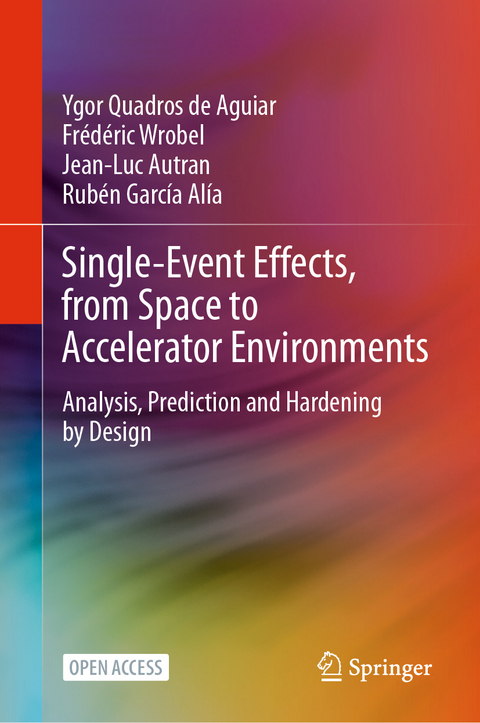
Single-Event Effects, from Space to Accelerator Environments
Springer International Publishing (Verlag)
978-3-031-71722-2 (ISBN)
This book describes the fundamental concepts underlying radiation-induced failure mechanisms in electronic components operating in harsh environments, such as in space missions or in particle accelerators. In addition to providing an extensive overview of the dynamics and composition of different radiation environments, the authors discuss the failure mechanisms, known as single-event effects (SEEs), and dedicated failure modeling and prediction methodologies. Additionally, novel radiation-hardening-by-design (RHBD) techniques at physical layout and circuit levels are described.
Readers who are newcomers to this field will learn the fundamental concepts of particle interaction physics and electronics hardening design, starting from the composition and dynamics of radiation environments and their effects on electronics, to the qualification and hardening of components. Experienced readers will enjoy the comprehensive discussion of the state-of-the-art in modeling, simulation, and analysis of radiation effects developed in the recent years, especially the outcome of the recent European project, RADSAGA.
- Describes both the fundamental concepts underlying radiation effects in electronics and state-of-the-art hardening methodologies
- Addresses failure mechanisms, known as single-event effects (SEEs), and dedicated failure modeling and prediction methodologies
- Reveals novel radiation-hardening-by-design (RHBD) techniques at physical layout and circuit levels
- Offers readers the first book in which particle accelerator applications will be extensively included in the radiation effects context
This is an open access book.
Y. Q. Aguiar received a B.Sc. degree in Automation Engineering from the Universidade Federal do Rio Grande, Brazil, in 2015, and a M.Sc. degree in Microelectronics from the Universidade Federal do Rio Grande do Sul, Brazil, in 2017, and a Ph.D. degree in Electronics Engineering from the Université de Montpellier, France, in 2020. During his thesis, he was a Marie Sklodowska-Curie Fellow in the RADSAGA Innovative Training Network. He concentrated his studies on the application of prediction methodologies to evaluate radiation effects in electronics and the exploration of novel radiation hardening by design techniques. He was awarded the 2020 Paul Phelps Award from the IEEE Nuclear and Plasma Sciences Society (NPSS) during the Nuclear and Space Radiation Effects Conference (NSREC). Currently, he is a senior research fellow at the European Organization for Nuclear Research (CERN), in Geneva, Switzerland. His current activities are focused on the assessment of the radiation environments within the Large Hadron Collider (LHC) complex for the application of Radiation Hardness Assurance (RHA) methodologies. He has also been pointed as a technical and scientific support officer in the RADNEXT European Research Infrastructure. His main research topics includes the analysis and modeling of radiation effects in electronics, device variability effects, hardening techniques for digital circuit design,radiation hardness assurance and dosimetry.
F. Wrobel, after a university degree in nuclear physics and instrumentation, performed his doctoral thesis at the University Montpellier 2, under the direction of Professor Jean-Marie Palau, on the issue of the reliability of SRAM memories. In 2002, he joined the University of Nice Sophia Antipolis first as Assistant Professor (ATER) and then the following year as Associate Professor. He worked on the radiation-matter interaction for medical applications (dosimetry) and electronic (reliability). In 2008, he joined the RADIAC team in the University of Montpellier 2 and since then he has been working on the development of tools for predicting error rates in electronic components as well as the contamination of component materials by alpha emitters. Frédéric Wrobel received his accreditation to supervise researches (HDR) in December 2008, and later, in 2010, he was awarded the Great Price of electronics "General Ferrié" for his works on nuclear physics codes and their original and innovative validations by stratospheric balloon flights. Additionally, he was awarded the Price "Chercheur d'Avenir" (Region Languedoc Roussillon) for his work on radiation in atmosphere. He is author and co-author of over 180 articles in journals and international conferences. In 2011, he became head of the specialty of Master EEA "Dependability Engineering Space". His field of expertise is radiation-induced single-event upset and he works both at radiation-matter interaction and electronic devices levels. In particular, he developed predictive tools that estimate the sensitivity of devices to radiation (neutrons, protons, ions). In 2012, Frédéric Wrobel became a junior member of Institut Universitaire de France (IUF) and since 2014 he is a Full Professor.
J.L. Autran received the Materials Science and Engineering Degree and the Ph.D. Degree in Microelectronics, both from the National Institute of Applied Sciences (INSA) of Lyon in 1992 and 1994 respectively. In 1999, he was awarded the accreditation to supervise research (HDR) from University Claude Bernard Lyon-1. Since 2000, he has been Full Professor of physics at Aix-Marseille University. From 2003 to 2008, he was member of the Institut Universitaire de France (IUF) and from 2017 to 2023, he was the Head of the Institut Matériaux Microélectronique Nanosciences de Provence (IM2NP Laboratory). Currently, he is the Head of the Institut de Physique de Rennes. His current research works concern the physics
Radiation environments and their effects on electronics.- Introduction to Single-Event Effects.- Single-event effects prediction methodologies.- Radiation Hardness Assurance (RHA) methodologies.- Radiation hardening techniques.- Analysis of RHBD techniques at layout level.- Analysis of RHBD techniques at circuit level.- Hardness improvement based on signal probability.- Conclusions/Future Perspectives.
| Erscheinungsdatum | 19.10.2024 |
|---|---|
| Zusatzinfo | X, 141 p. 89 illus., 84 illus. in color. |
| Verlagsort | Cham |
| Sprache | englisch |
| Maße | 155 x 235 mm |
| Themenwelt | Technik ► Elektrotechnik / Energietechnik |
| Technik ► Luft- / Raumfahrttechnik | |
| Schlagworte | Radiation Effects on Integrated Circuits and Systems • radiation hardening by design • Radiation Hardening by Process • RADSAGA • Single Event Effects in Aerospace • Soft Errors from Particle to Circuits |
| ISBN-10 | 3-031-71722-8 / 3031717228 |
| ISBN-13 | 978-3-031-71722-2 / 9783031717222 |
| Zustand | Neuware |
| Haben Sie eine Frage zum Produkt? |
aus dem Bereich


